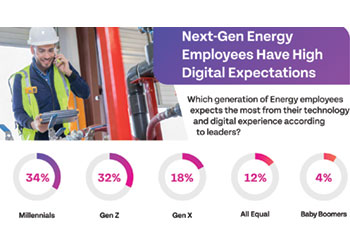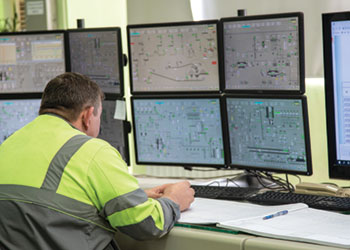
 Energy sector workers believe AI will enhance career prospects and job satisfaction
Energy sector workers believe AI will enhance career prospects and job satisfaction
The 2024 Global Energy Talent Index report highlights a shift towards greater demand for human skills and the emergence of new opportunities for career development
As artificial intelligence (AI) reshapes everything from job roles to skills in demand and whether workplace policies and training priorities are keeping up, the energy sector is exploring the extent of AI adoption, popularity and policy awareness across the sector and anticipating the major risks and opportunities it presents.
Airswift’s latest edition of the Global Energy Talent Index (GETI) features insights from professionals working in the renewables, oil and gas, petrochemicals, power, and nuclear industries.
The report highlights the impact of AI on the sector, highlighting a shift towards greater demand for human skills and the emergence of new opportunities for career development.
The key findings from this year’s report include:
• AI’s influence on skills demand: Over 90 per cent of energy workers anticipate AI driving demand for new skills, including programming, critical thinking and creativity.
Some 96 per cent say AI will increase demand for human skills. Technical skills such as programming/software engineering and IT (both 27 per cent) top the list, followed by machine learning (26 per cent).
Twenty-four per cent anticipate demand for cyber security and 23 per cent for robotics skills, yet few workers are being influenced to develop cyber and robotics skills (18 per cent and 16 per cent, respectively), creating potential skills shortages in these areas.
• Optimism on productivity: A significant majority (82 per cent) of energy professionals are optimistic about AI’s impact, with 74 per cent believing it will boost productivity.
AI has the potential to transform energy processes and production from autonomously selecting the most cost-effective energy mix for electrolysers to data-driven synchronisation of generation and demand.
• Career prospects: 60 per cent of respondents believe AI will enhance career prospects and job satisfaction, while also potentially improving work/life balance for over half of workers surveyed.
Amidst an accelerating clean energy transition, renewables salaries are on an upward trajectory, with 51 per cent of professionals reporting a pay rise compared to 47 per cent last year.
Salary optimism also remains high, with 73 per cent expecting a pay rise next year compared with 74 per cent last year.
Among other positive impacts of AI, respondents cite future increases in research and development (33 per cent) and optimisation of productions, services and/or solutions (29 per cent).
However, this is clouded by significant concerns around a lack of human or personal touch (43 per cent), insufficient training leading to misuse or poor adoption (34 per cent) and cyber security risks (31 per cent).
Highlighting the significance of these findings, Janette Marx, Airswift CEO, says: "AI is increasing the demand for skills in the energy industry, unlocking opportunities for greater use of human skills such as critical thinking and creativity. Energy workers that learn these newly in-demand skills will have more career choices in the future."






































































